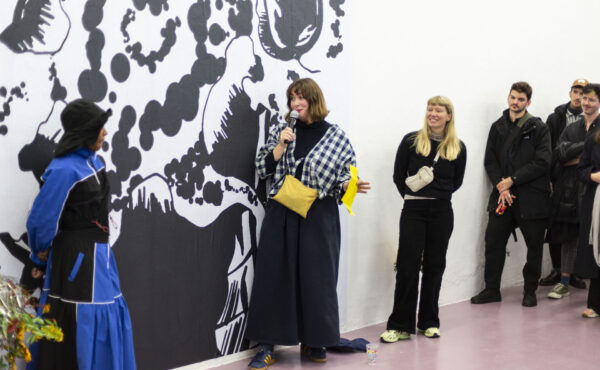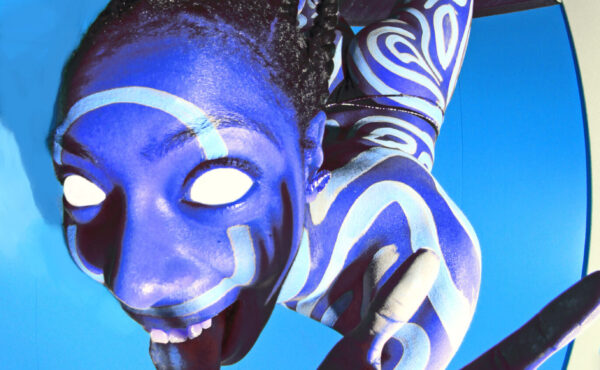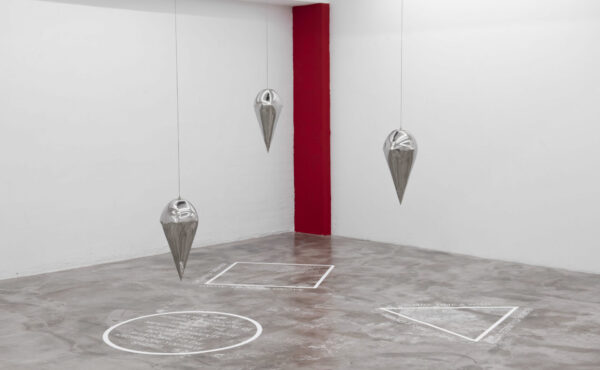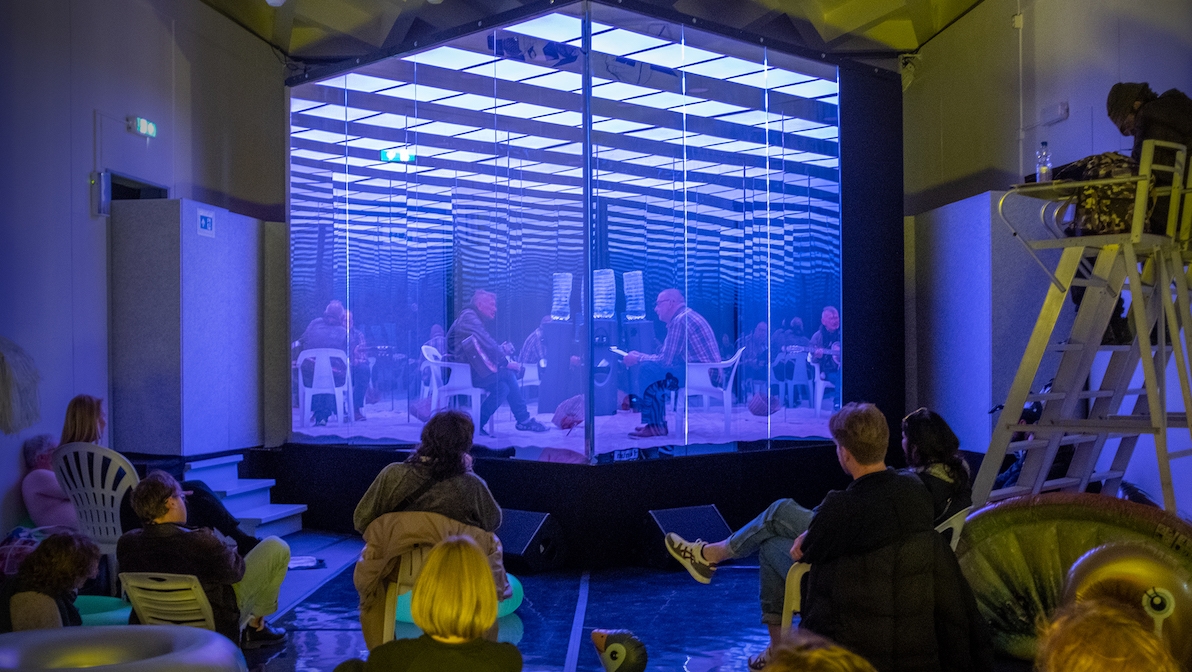
Studio Julian Hetzel, ‘There Will Be Light’, West Den Haag, photo: Dana LaMonda
The uncanny ambiguity of hope – Julian Hetzel’s There Will Be Light
A door opens, an interviewee enters. Studio Hetzel is giving away €15.000 to one person, and a deconstructed beach at WEST Den Haag hosts the selection procedure. “What is your first memory of money? What is the most expensive thing you own? How much money do you have?” There Will Be Light presents a firm critique of the contemporary world of competition and precarity by performing the very thing it so vocally rebukes.
Entering into the dark, sizeable room of Julian Hetzel’s latest project There Will Be Light at West Den Haag feels like walking into a scene from a fever dream. The brutalist architecture of the former American embassy is suddenly disrupted by a large opaque glass box, with various miscellaneous inflatable pool- and beach items dispersed on the floor around it.
Hetzel is giving away €15.000, and it is this deconstructed beach that hosts around 70 interviews to select seven finalists and decide to whom the artist’s studio is going to be awarding the money. The applicants signed up in response to an open call put out by Hetzel’s studio, which was at once vague and extremely concrete: “We are looking for a person.”
[blockquote]The applicants signed up in response to an open call put out by Hetzel’s studio, which was at once vague and extremely concrete: “We are looking for a person”
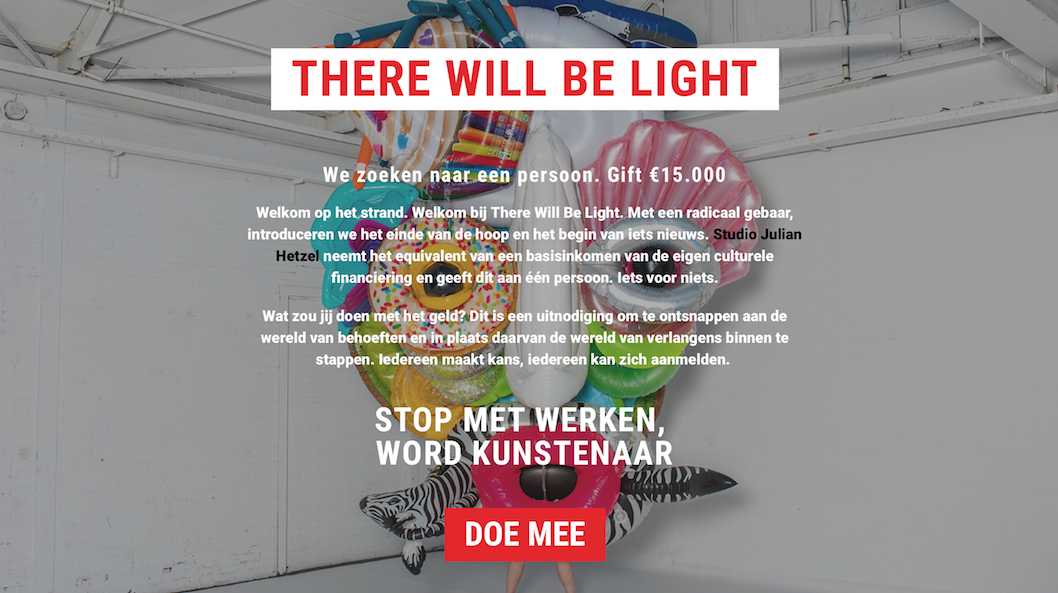
Studio Hetzel open call There Will Be Light
Interviewed by a panel of “alternative experts” – people currently living in The Hague without a permanent place of residence – the applicants are to argue why they should be the receiver of the sum of money that is roughly equal to a yearly basic income. Simultaneously a critical exploration of wealth distribution and a meta-reflection on the coalescence of life and art, the work does not shy away from showing its radically subversive nature.
I enter the space as a new cycle starts. Every thirty minutes, an interview takes place: the opaque glass box becomes translucent, then transparent, revealing an interviewer sitting across from an empty plastic chair, a clipboard in their lap. Two other panel members sit and quietly observe from tall lifeguard-chairs in the same space as the audience. From the outside, the I can see that the inside of the box is highly reflective; from the inside, you cannot see outwards.
A door opens, an interviewee enters. Sitting down across from the clipboard-carrying expert, they introduce themselves to one another, and the interview starts. There are several recurring questions throughout all of the interviews – what is your first memory of money? What is the most expensive thing you own? How much money do you have?
Interviewed by a panel of “alternative experts” – people currently living in The Hague without a permanent place of residence – the applicants are to argue why they should be the receiver of the sum of money that is roughly equal to a yearly basic income
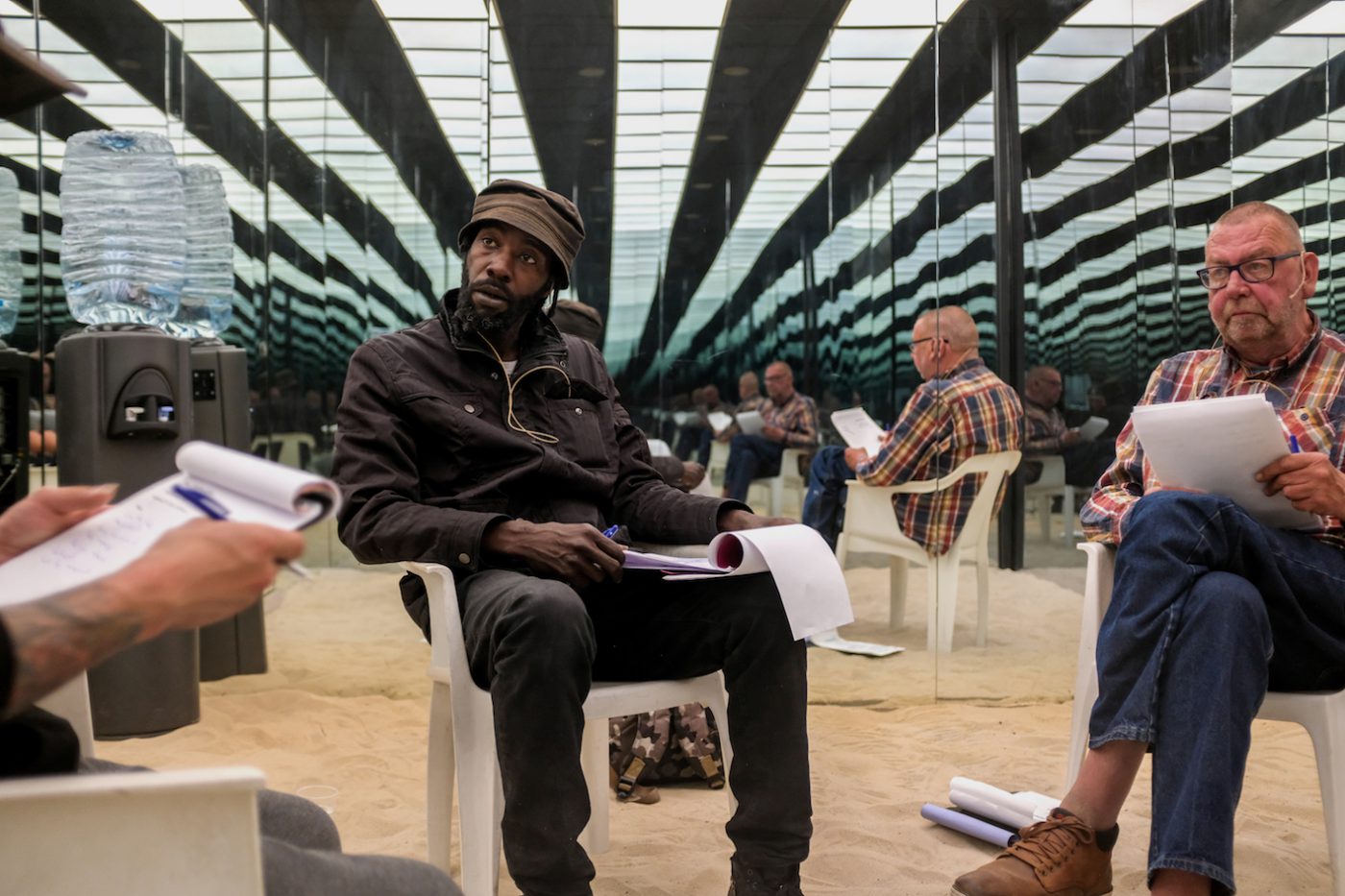
Studio Julian Hetzel, 'There Will Be Light', West Den Haag, photo: Dana LaMonda
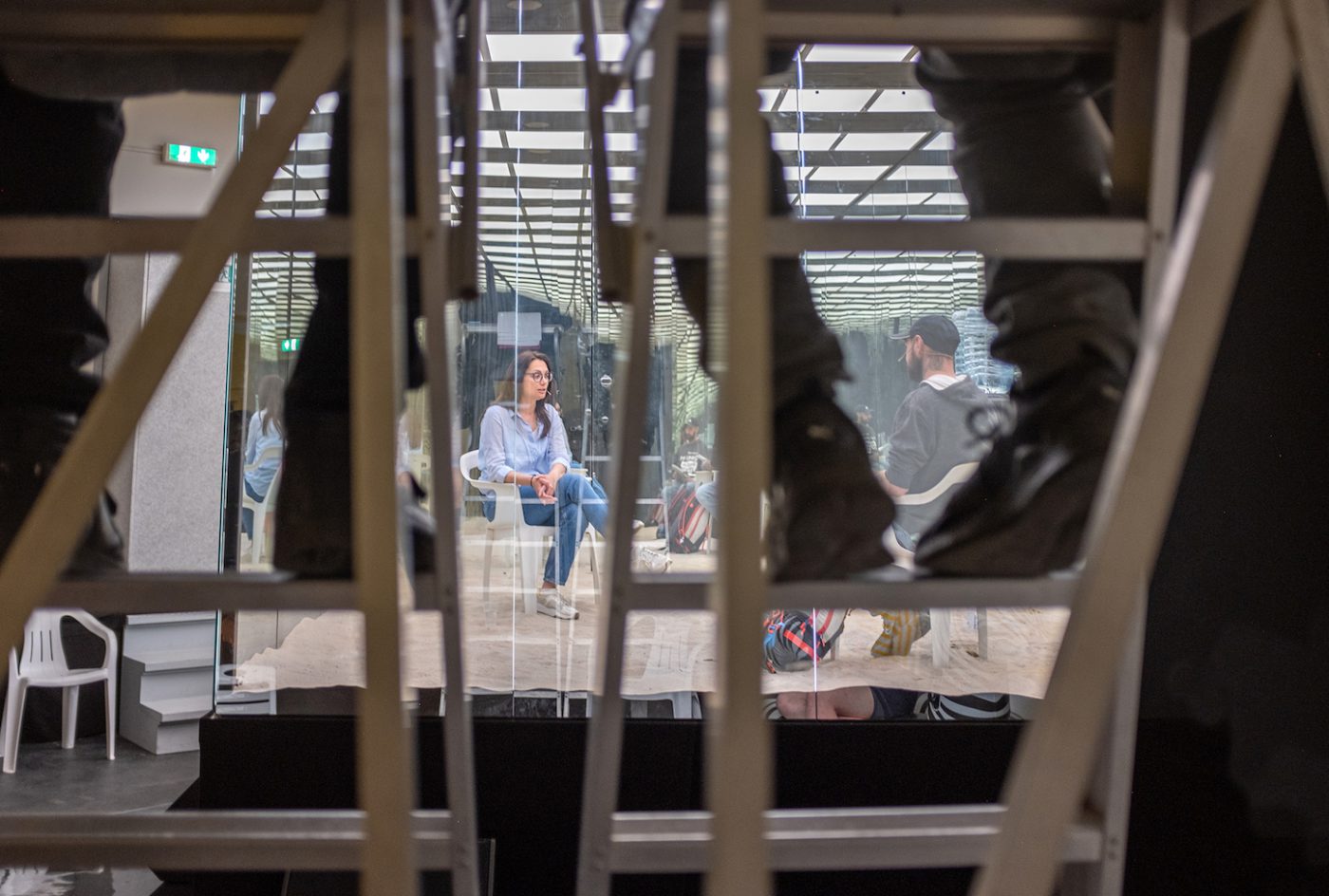
Studio Julian Hetzel, 'There Will Be Light', West Den Haag, Interview, photo: Dana LaMonda
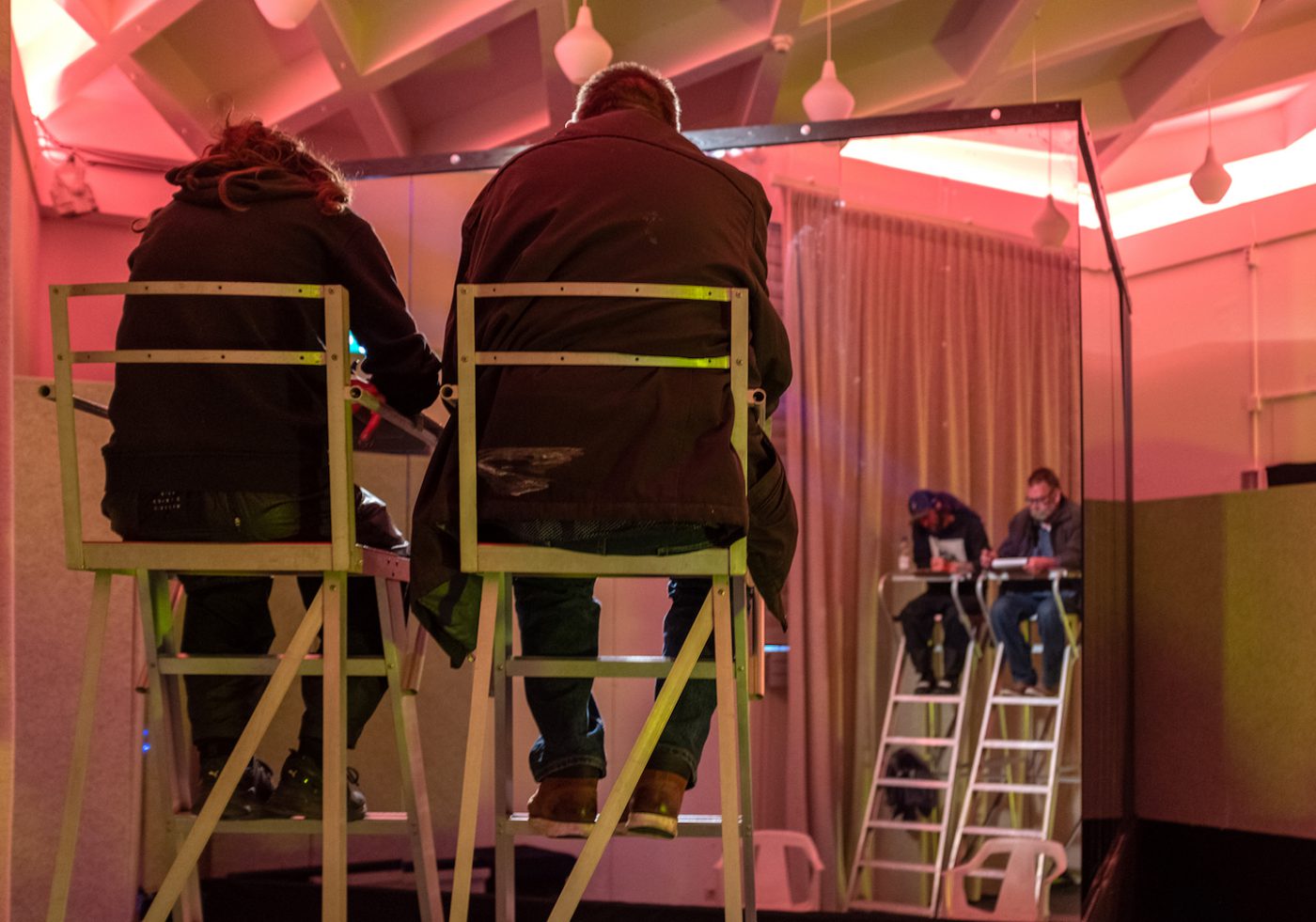
Studio Julian Hetzel, 'There Will Be Light', West Den Haag, Jury, photo: Dana LaMonda
The responses are often hesitant. Nervous laughter precedes carefully worded answers as the participants attempt to make sense of the uncanny situation they find themselves in. How do you argue that you deserve the money while remaining humble and respectful towards the homeless person that now holds your fate in their hands? What results is a range of various types of conversations: while some feel like job interviews, others seem more like police interrogations.
The white light inside of the box, the infinite number of reflections in its mirrors, and the ambient, suspenseful soundscape constantly playing in the background make for an enticing spectacle. Knowing that the interviewee cannot see me, it appears inviting to simply and shamelessly gaze at the interaction happening in front of me. When I briefly talk to Hetzel, he mentions how some viewers are caught in a grasp of focused fascination, sometimes lasting for hours on end. Hetzel: “It is almost as if they are binge-watching a Netflix-show.”
While at first it seems easy to become entirely consumed by this voyeuristic position, it is the presence of several performers in the audience that gently but assertively disrupts these distant acts of viewing. In the ten minutes of transitioning from one interview to the next, the actors, dressed in full beach attire, move around the space, seeking interaction with the audience members. A single moment of eyes meeting is the key to the opening of a casual conversation; about the performance, about each other’s personal lives, anything appears to go. And yet, however casual the conversations may be, they make the viewer aware that they are, in fact, not innocent or passive observers; instead, they are part of the very scene they gaze at.
These encounters are unexpected, yet not surprising: the sense of a largely unorganised and anarchistic free-for-all that typifies the general beach experience is retained in the mixing and mingling in the art space. I select an especially comfortable-looking inflatable donut from where I see both interviewer and interviewee in profile. The squeaky plastic underneath me betrays my every movement to the other audience members, and vice versa. The interviewers, interviewees, employees of West, but especially the other audience members and performers are all vital elements in this socially entangled space.
Hetzel: “It is almost as if they are binge-watching a Netflix-show”
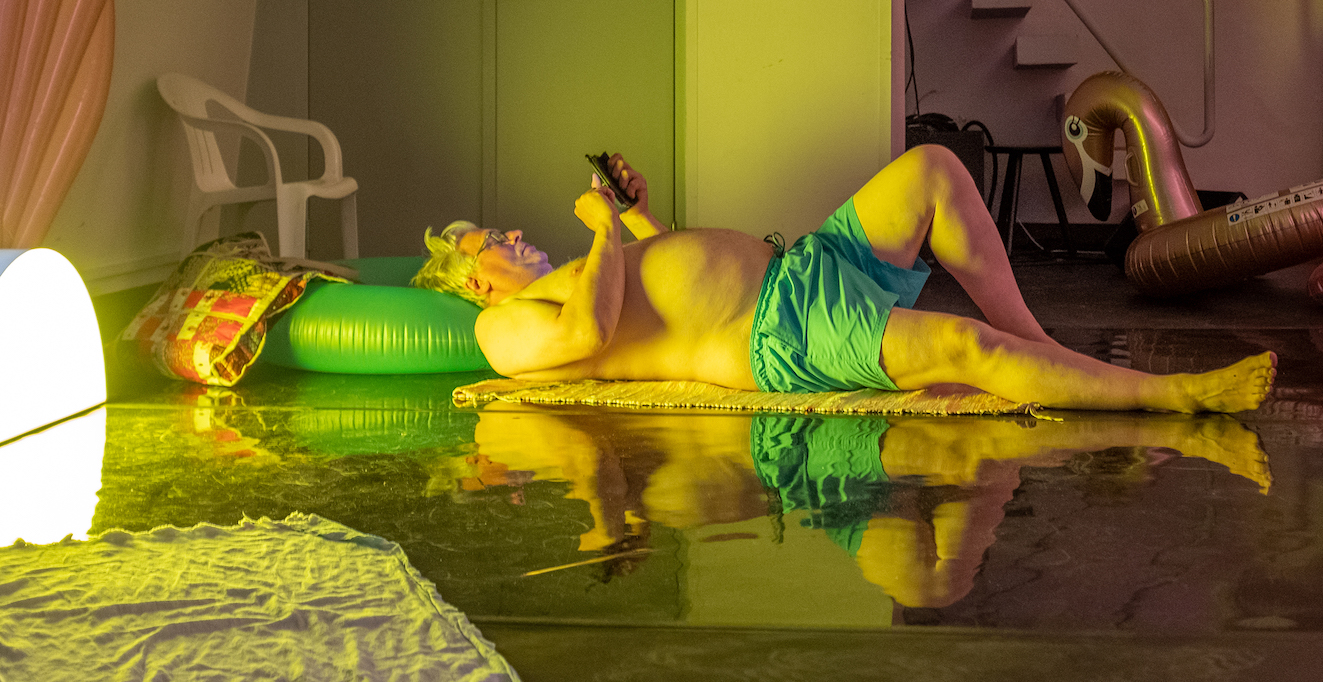
Studio Julian Hetzel, 'There Will Be Light', West Den Haag, photo: Dana LaMonda

Studio Julian Hetzel, 'There Will Be Light', West Den Haag, photo: Dana LaMonda
Later on in the week, I attend the project’s Grand Finale. The space now looks like the set of a television gameshow, with the previous anarchy of the beach making place for rows of seats and a strictly organised 90-minute theatre piece. For the first time, the audience is addressed from inside the box – each selected finalist takes the floor to make their plea, before engaging in a series of everyday tasks given by an invisible yet omnipresent loudspeaker. It is the evaluation of these inherently non-competitive tasks – drink some water, eat some fruit, breathe – through which the jury gradually eliminates all contestants until only the winner remains in the box.
The proximity to my fellow audience members, as well as the resulting heat and stuffiness of the room exacerbates the sense of discomfort that naturally arises as we watch seven individuals competitively perform everyday tasks for the invisible audience and jury. The voyeurism of the days prior skyrockets as the contestants address us – while unsuccessfully attempting to look through the mirror, their gaze remains empty and glazed without catching a glimpse of the many pairs of eyes, staring back at them.
The performers that previously disrupted the audience now concretely present the rationale of the project from inside the glass box and tell us much of what Hetzel had told me a few days earlier. Hetzel characterises the beach as “a place of that which lies beyond”. To him, the horizon separating the sea from the sky represents the classic grass-is-greener-experience. Hetzel: “Whenever I am at the beach, I always long for that which is on the other side of the water. Just like with hope, it’s always about a there and then, rather than a here and now.”
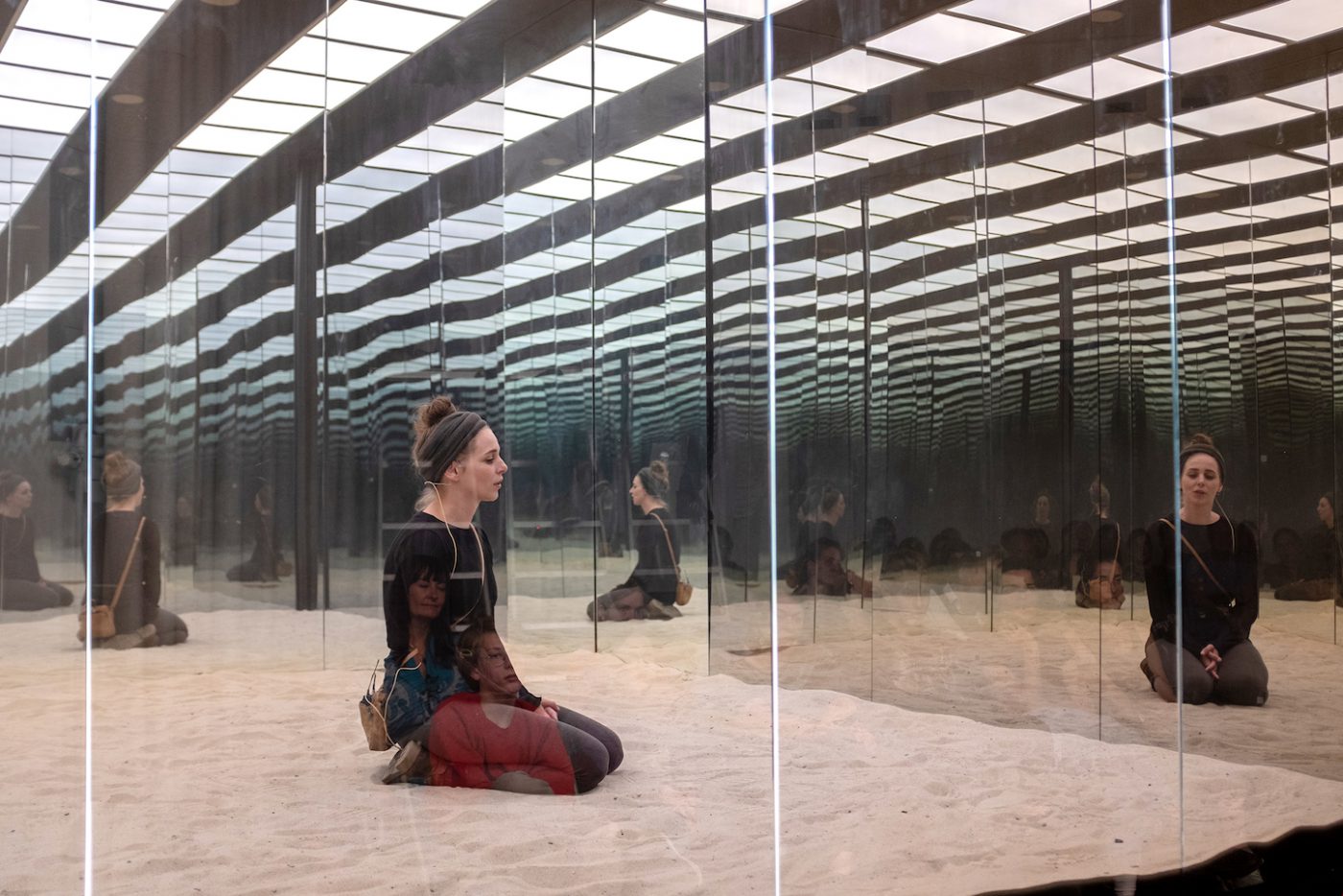
Studio Julian Hetzel, 'There Will Be Light', West Den Haag, Last Presentation, photo: Dana LaMonda
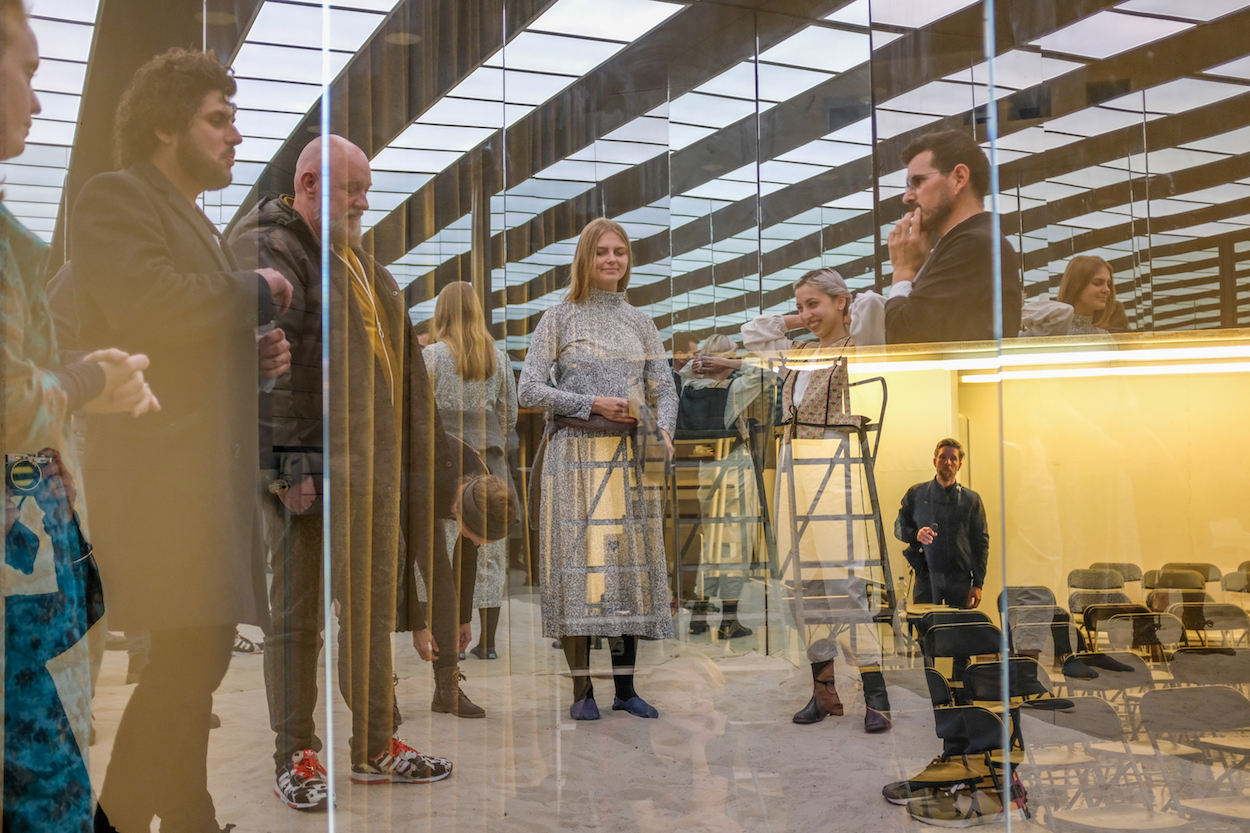
Studio Julian Hetzel, 'There Will Be Light', West Den Haag, Grand Finale, photo: Dana LaMonda
Hope is then something, somewhere else, in a time that is yet to come. Naturally, it thus becomes an inherently precarious notion; to hope is to embody a position of privilege that allows the imagination of that thing in another time and place. It is this question of the supposed ambiguity of hope that permeates the entire project: the interviews, judged by a group of individuals who know what precarious living can look like, consistently include the deceivingly simple question: Is hope a good or a bad thing?
There Will Be Light presents a firm critique of the contemporary world of competition and precarity by performing the very thing it so vocally rebukes. Within the project, there is an upheaval of hierarchies and power dynamics, but solidarity remains far out of sight and even further out of reach. As always, it is selection over distribution, exclusion over inclusion, preference over need.
The description of the project states that Hetzel’s studio is providing “something for nothing”; a lucky individual walks away with the money without having to give anything in return. And yet, in order to actually receive the money and, hopefully, move closer to their hopes and dreams, they have to sign a contract that officially frames the next year of their lives as a one-year durational performance. In face of the inevitable commencement of the simultaneously liberating and (conceptually) limiting nature of written constructions of legality and obligation, the ambiguity of hope once again reveals its face.
Hetzel does not offer any utopian alternatives, but simply reinscribes a dystopian reality that already exists and permeates deeply into the exhibition space
As such, Hetzel does not offer any utopian alternatives, but simply reinscribes a dystopian reality that already exists and permeates deeply into the exhibition space. There is no presentation of an alternative system, but merely a shift in the who-does-what of things – the work explores and defines the parameters of the world in which it exists. This world is evidently one of capitalism and competition in everyday life, but, as Hetzel explores throughout this project, is also deeply embedded within the institutions of art, exhibitions, and theatre.
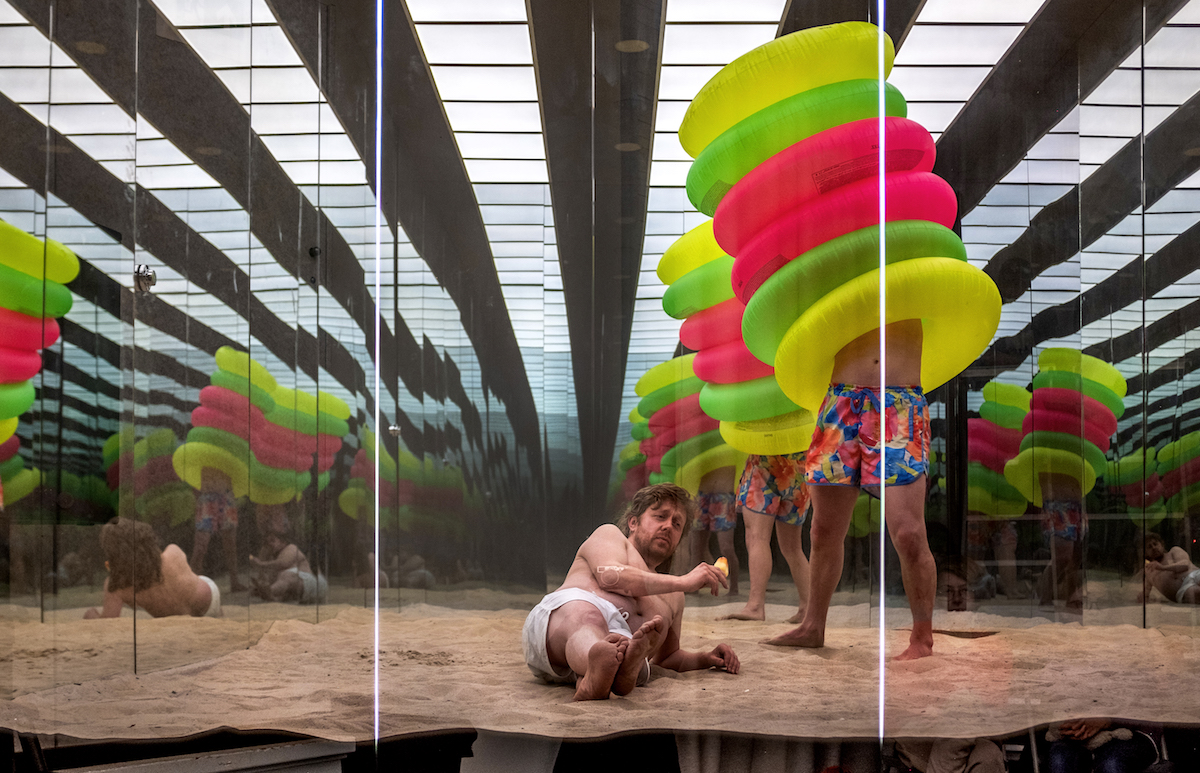
Studio Julian Hetzel, 'There Will Be Light', West Den Haag, photo: Dana LaMonda
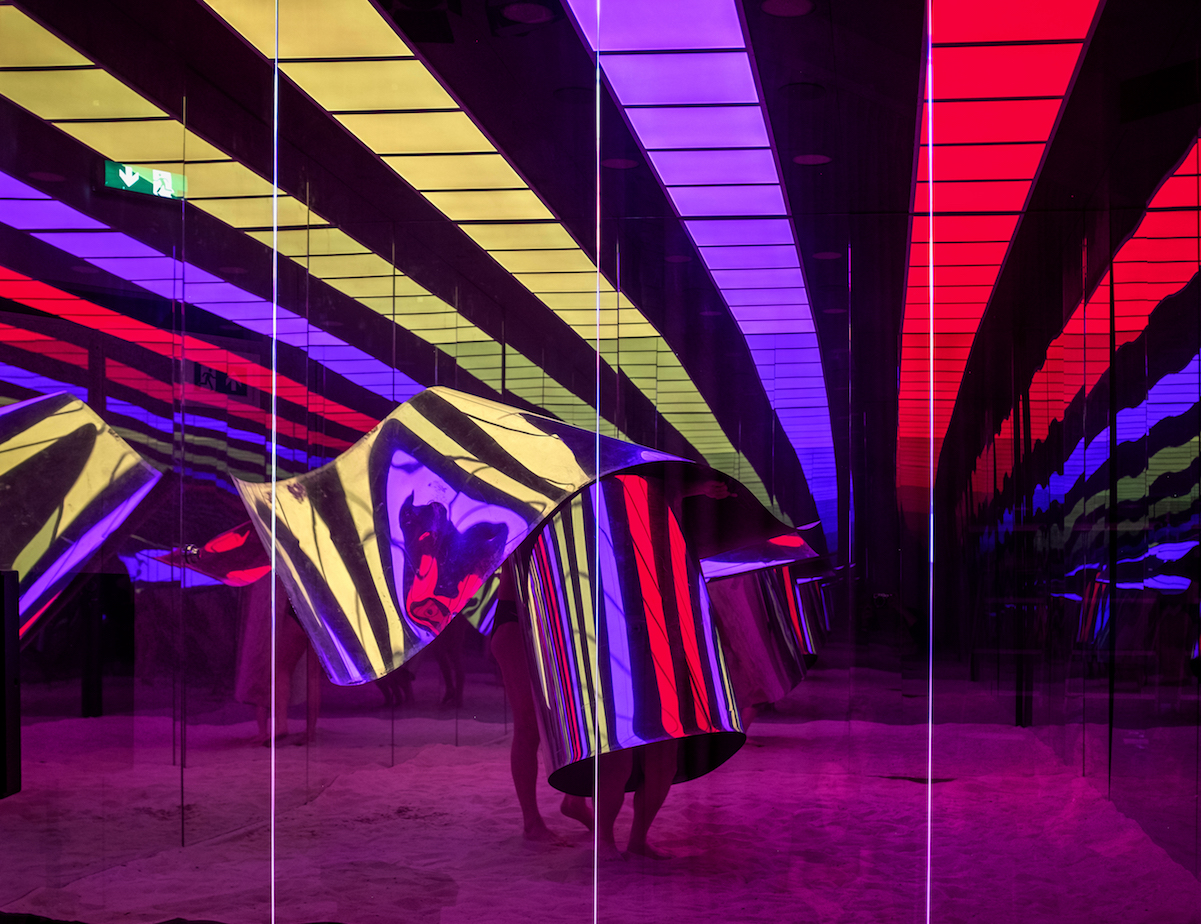
Studio Julian Hetzel, 'There Will Be Light', West Den Haag, photo: Dana LaMonda
The presentation of this performance piece at West, which previously hosted similarly socially critical theatrical works, reveals how the art world is itself caught up in the chokehold of the spectacle of precarity – and, perhaps more often than it would like to admit, even tightens its grip. Don’t forget that the audience and host institution are now, even more viscerally than before, accomplices to the injustices that the project addresses. Are we not all, merely by attending and facilitating this event, upholding and re-performing those economies of precarity-spectacles?
There Will Be Light leaves you with more questions than answers and succeeds in extending the uncanniness of the criticised situation onto the work’s audience and its physical, institutional space. Within the projected ambiguity of hope resides a searingly concrete critique of the relentlessly permeating economy of precarious spectacles, penetrating into the centre of systems of capitalism and unequal wealth distribution around the world, but also certainly no less into the heart of the audience and the art world itself.
There are two more editions of There Will Be Light to come: from May 12-20 at SPRING Festival, Utrecht, and from June 24 until July 2 at Grand Theatre, Groningen
Joris van den Einden
is an intern at Metropolis M
















